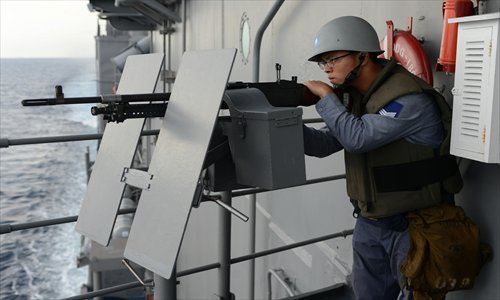HOME >> OP-ED
Taiwan justified in taking tough stance
Source:Global Times Published: 2013-5-16 1:13:01

A Taiwan sailor operates a machine gun on a Kidd-class destroyer as it patrols in the Taiwan Straits during a drill on Wednesday aimed at defending its fishermen in disputed waters. Photo: AFP
Daily speical:
| Manila ready to apologize for fisherman's death |
Yesterday, Taiwan announced the initiation of three sanctions and eight new sanction measures against the Philippines.
Public opinion in Taiwan has forced the Ma Ying-jeou administration to transform its attitude from hesitant to hard-line. This is the most resolute position Taiwan has taken in maritime disputes between China and other countries in recent years.
Taiwan has long avoided cooperation with the Chinese mainland in territorial disputes, but the mainland's countering of the arrogance of countries such as the Philippines and Japan also inspire it.
Maritime frictions in East Asia involve maritime disputes, which touch the core interests of these countries. There will always be people who see China's patriotic feelings as nationalism related to the mainland's political system. But Taiwan's involvement helps us see the issue clearly.
Taiwan is surrounded by sea. It has maritime disputes in both northern and southern parts, which directly threaten the security of its fishermen. Due to its small size, maritime frictions may have more impact on Taiwan than the mainland.
The lesson the Ma Ying-jeou administration taught the Philippines will not only benefit Taiwan in the long run, but also contribute to the interests of the whole Chinese people.
Viewed from the eight new sanction measures, the Ma Ying-jeou administration has tried its best.
Taiwan sticking to its position is of great significance. Strategically speaking, this action has almost created a "second front" for the Chinese people to safeguard maritime sovereignty.
Taiwan's action gives China a higher moral ground to take resolute countermeasures against the Philippines. It confounded the false idea that surrounding countries are "being bullied by China." The complexity of maritime problems in East Asia has been shown to all and Chinese people's rights to safeguard their own maritime territory have become indisputable.
The Chinese mainland should give moral support and extensive coordination to Taiwan's just move. We should encourage Taiwan to take the lead role in this incident while never shirking our responsibility.
Maritime disputes in the East and South China Sea will inevitably last a long time. The Chinese people's ability to protect its rights are incomparable and China's maritime strategic advantage is gradually forming.
Whether we have the ability to keep maritime disputes under control and whether the resolution of these disputes is in line with our comprehensive expectation on the strategic situation in East Asia will be our next tests.
China should protect every inch of its territory. However, there are still other strategic goals which China urgently needs to meet. Simultaneously achieving all these goals is in our best interests.
The more powerful we are, the more likely we can better arrange our time and our road map.
Taiwan and the mainland should pursue a "complete victory" over the Philippines this time. After this, both sides may have a new understanding of each other on aspects such as common interests and mutual trust.
Posted in: Editorial